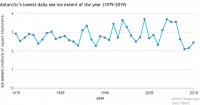BartW
Gold Member
- Joined
- Nov 30, 2008
- Messages
- 2,962
- Likes
- 2,026
This thread took an interesting turn. Sea level rise isn’t because of climate change, it’s from all the plastic we dump in the ocean! No wait, it’s because of the boats! That’s a good one; I’ve never heard that angle before. Points for creativity!
Yes it’s swell to see Volnation have this concern for our oceans all of the sudden. I wonder, though, do any of you actually support ways to fix the problems? Will it cost money? Will it require international cooperation? Or do you just want to sit around and complain about poor environmental standards in developing countries while complacently doing nothing?
If you are concerned about the state of the oceans, what are your thoughts on ocean acidification and oxygen depletion? These are direct effects of fossil fuel combustion. This is indisputable even by anti-climatist standards (I like that verbiage, too ).
).
Coral reefs are home to 25% of the world’s marine biodiversity. Does it bother you that half of the world’s coral reefs have died in the past 50 years, and the other half will likely be gone within decades? Do you know that some of Earth’s largest extinction events, including the greatest end-permian event in which over 90% of marine species disappeared, was the result of geologically rapid CO2 release via volcanism causing high rates of climate change and ocean acidification? Does it bother you at all that such geologically rapid outgassing is very comparable to present anthropogenic rates?
On related notes, how do you feel about the Trump administration relaxing regulations against overfishing and even subsidizing the commercial fishing industry? How about the expansion of offshore drilling? The removal of marine protected areas? Do you really care about the health of our oceans, or do you only care insofar that you think its convenient to your anti-climatist diatribe?
Yes it’s swell to see Volnation have this concern for our oceans all of the sudden. I wonder, though, do any of you actually support ways to fix the problems? Will it cost money? Will it require international cooperation? Or do you just want to sit around and complain about poor environmental standards in developing countries while complacently doing nothing?
If you are concerned about the state of the oceans, what are your thoughts on ocean acidification and oxygen depletion? These are direct effects of fossil fuel combustion. This is indisputable even by anti-climatist standards (I like that verbiage, too
Coral reefs are home to 25% of the world’s marine biodiversity. Does it bother you that half of the world’s coral reefs have died in the past 50 years, and the other half will likely be gone within decades? Do you know that some of Earth’s largest extinction events, including the greatest end-permian event in which over 90% of marine species disappeared, was the result of geologically rapid CO2 release via volcanism causing high rates of climate change and ocean acidification? Does it bother you at all that such geologically rapid outgassing is very comparable to present anthropogenic rates?
On related notes, how do you feel about the Trump administration relaxing regulations against overfishing and even subsidizing the commercial fishing industry? How about the expansion of offshore drilling? The removal of marine protected areas? Do you really care about the health of our oceans, or do you only care insofar that you think its convenient to your anti-climatist diatribe?



